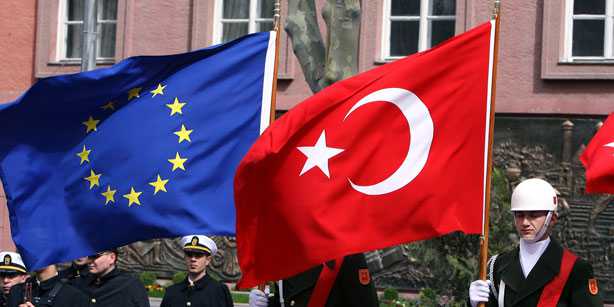AMANDA PAUL
a.paul@todayszaman.com
Is Turkey’s EU dream coming to the end of the road?
In a couple of weeks the European Commission will publish its annual Progress Report on Turkey’s progress towards becoming a member of the EU.
One could say it represents something of a scorecard for Turkey’s efforts in meeting EU demanded reforms in both economic and political terms, including underlining areas where Turkey needs to make much greater efforts.
While on the one hand, one may say that this year’s report, more than any other so far, has become irrelevant because the chances of Turkey ever joining the EU seem to be reducing by the day, but on the other it is still serves as a useful tool for monitoring the political and economic situation in the country and how Turkey is progressing on issues such as minority rights, fundamental freedoms, human rights, the Kurdish issue, etc.
Turkey’s EU journey began over half a century ago in 1959 when Turkey was given associate membership status. In 1964, the Association Agreement between the then- “European Economic Community” (EEC) and Turkey provided to establish far-reaching economic cooperation, from a customs union to free movement of labor with a preamble containing a reference to eventual membership. And again at the Helsinki Summit in December 1999, when Turkey was finally granted candidate country status, the communiqué of the summit read “Turkey is a candidate country destined to join the EU on the basis of the same criteria applied to all other candidates.” Nice words, but unfortunately the EU has not applied the same approach to Turkey as it did with the other candidates.
In 2005, Turkey’s membership talks kicked off, together with Croatia. Some six years later, Croatia has finalized its negotiations and is on the verge of becoming the 28th member of the EU. For Turkey, it has been a different story. The membership talks are frozen with some 18 negotiating chapters blocked. While leaders from both sides continue to smile and pretend that there is still a commitment, behind closed doors the air is filled with mutual recrimination. Confidence and trust have evaporated. Turkey has been left frustrated by the unrelenting positions of France and Germany (among others), which continue to violate the EU’s commitment to full membership by talking about “alternatives,” while the EU’s reluctance to offer Turkey visa liberalization (something which all other candidate have) has added salt to the wound. Turkey has also played its part. Turkey is a proud nation which has been a crucial ally of the West, including through its membership of NATO for decades. The idea that countries which Turkey considered “friends” could so blatantly reject them and label them as unsuitable for EU membership has been a difficult to deal with. Today, Turkey’s reform process has slowed down, while Ankara continues refuse to meet its commitments vis-à-vis the Ankara Protocol. Cyprus continues to be at the epicenter of the problem. The EU’s decision to allow a divided island into the EU has had serious repercussions and has only served to make a difficult problem even more intractable. Confident in their EU seat, the Greek Cypriots have felt more able to take on tougher positions in peace talks for reunification.
Furthermore, tensions about Cyprus have reached a new climax following the discovery of off-shore natural gas reserves in the eastern Mediterranean, particularly in the economic zones of Israel, Lebanon and Cyprus. Cyprus has infuriated Turkey by concluding an agreement with Israel on the delimitation of their respective economic zones. The anger culminated earlier this month with the government of Greek Cyprus deciding to start drilling for gas southeast of the island and the Turkish government threatening that it would not accept this and going on to conclude an agreement on the delimitation of the continental shelf with the “government” of the “Turkish Republic of Northern Cyprus” (KKTC), which since its creation in 1983 has not been recognized by any other country other than Turkey.
This has been compounded by Turkey announcing that it will suspend relations with the EU in July 2012 when the Greek Cypriots take up the rotating EU presidency, unless negotiations on the reunification of the island will have been successfully concluded by then, which is highly unlikely. All in all — combined with Turkey’s deteriorating relations with Israel — the eastern Mediterranean has become a very hot spot, although anything beyond aggressive words would seem unlikely.
Meanwhile, the EU continues to have little interest in its once grand enlargement project being burdened with visionless leaders and an economic nightmare. Turkey, with its booming economy and increasingly important regional role, is growing surer of itself and eager to be the major political and economic player in the Middle East region.
Today, Turkish membership of the EU appears more distant than ever. With its 78 million dynamic people, Turkey feels strong enough to stand alone. As one of the major economic powers on Earth, a member of the OECD and G20, emulated as an example by Arab neighbors, it may consider EU membership no longer necessary for its economic development and politically more of burden than of benefit.
via Is Turkey’s EU dream coming to the end of the road?.


Leave a Reply